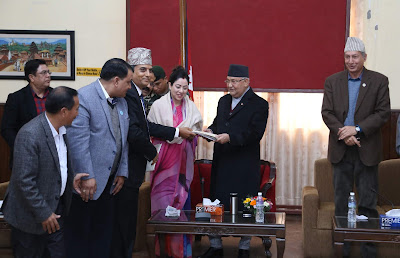Kathmandu, Feb. 21: Finance Minister Dr. Yuba Raj Khatiwada on Thursday
urged the Non-Resident Nepalis (NRNs) to invest in Nepal through mutual funds.
This is the high time to invest in Nepal as the country is set on the
path of economic growth and progress, and I have come here to discuss your
problems and investment potentials, he said while speaking at a programme
organised by the NRN Association – United Kingdom in London.
He said that Nepal aims at attracting large investment – both domestic
and foreign – in large infrastructure projects, especially in energy and connectivity,
agriculture and tourism. To showcase the potential in the primary investment
areas in the country, Nepal is organising an Investment Summit on March 29-30
this year.
Minister Dr. Khatiwada is in London to participate in Nepal Development
Conference where he will present the investment prospects in Nepal and request
the investors to come to Nepal.
"We have recently created a new provision on hedging in order to
provide a risk management tool for the investors investing in foreign currency,"
he said. He highlighted the recent economic reforms and the improved business
and investment environment in the country.
He said the recently published customs issues were exaggerations.
He urged one and all to take the goods that are useful to Nepalis through
the Tribhuvan International Airport (TIA) Customs and said that the checking at
the airport had been simplified and fast.
"Customs checking is normal everywhere around the world. The thing
that is considered a normal procedure has been made a controversial issue in
our case," he said.
Likewise, Dr. Khatiwada clarified that the tax rates were not hiked
instead a reform was made to simplify the tax process and administration.
He expressed his confidence that the country would achieve higher than 7
per cent economic growth as the things were moving in the right direction and
the International Monetary Fund (IMF) had also said that Nepal would achieve a
high economic growth this year.
Similarly, he said that the trade deficit was not a problem emerged all
of sudden but a structural problem since last many years.
He maintained that as the country has embarked on the track of creating
development infrastructure and developing agriculture and industrial sectors,
and the structure of production has been changed, the country was experiencing
trade deficit.
Dr. Khatiwada will address the Nepal Development Conference, to be
organised by the Nepali Embassy, London, as a keynote speaker on Friday. The
conference is said to support the Investment Summit.
Published in The Rising Nepal daily on 22 February 2019. 

